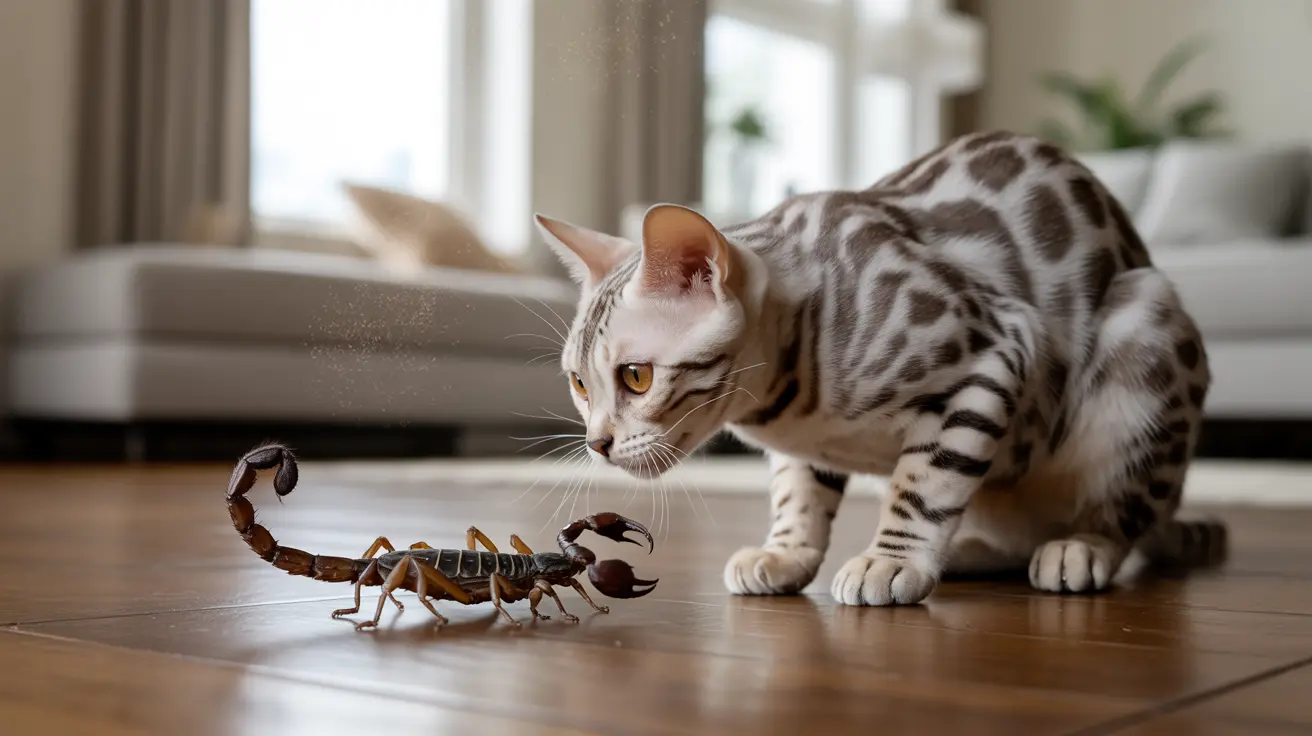For cat owners, especially those living in regions where scorpions are common, recognizing the signs of a scorpion sting is crucial for your pet's safety. While cats are generally more resistant to scorpion venom than smaller pets, quick identification and response can make a significant difference in their recovery.
This comprehensive guide will help you identify scorpion sting symptoms in cats, understand when to seek emergency care, and learn about effective treatment options and prevention strategies.
Common Signs of Scorpion Stings in Cats
Immediate Physical Symptoms
When a cat is stung by a scorpion, several physical symptoms typically appear right away:
- Sudden vocalization or crying out in pain
- Intense licking or pawing at the affected area
- Visible swelling or redness at the sting site
- Limping if stung on a paw or leg
- Twitching or muscle tremors near the sting location
Behavioral Changes
Cats often display noticeable behavioral changes following a scorpion sting:
- Unusual agitation or restlessness
- Hiding or seeking isolation
- Aggressive behavior when approached
- Reluctance to move or eat
- Excessive meowing or unusual vocalizations
Severe Symptoms Requiring Immediate Veterinary Care
Some symptoms indicate a potentially dangerous envenomation, particularly from species like the Arizona bark scorpion:
- Difficulty breathing or rapid breathing
- Excessive drooling or foaming at the mouth
- Dilated pupils or unusual eye movements
- Severe muscle tremors or seizures
- Collapse or loss of consciousness
- Vomiting or diarrhea
Treatment and First Aid
Immediate Steps
If you suspect your cat has been stung by a scorpion:
- Keep your cat calm and restrict movement
- Contact your veterinarian immediately
- Clean the sting site with cool water if possible
- Apply a cold compress to reduce swelling
- Monitor your cat's breathing and behavior
Professional Treatment
Veterinary treatment may include:
- Pain management medications
- Anti-inflammatory drugs
- IV fluids for support
- Antivenom in severe cases
- Monitoring of vital signs
- Supportive care as needed
Prevention Strategies
Protect your cat from scorpion encounters with these preventive measures:
- Seal entry points around your home
- Remove potential scorpion hiding spots
- Keep your yard well-maintained
- Consider professional pest control
- Check shoes and bedding regularly
- Keep cats indoors during peak scorpion activity
Frequently Asked Questions
How can I tell if my cat was stung by a scorpion?
Look for sudden pain reactions, localized swelling, excessive licking of a specific area, and behavioral changes such as hiding or unusual aggression. Your cat may also vocalize in pain or show signs of distress.
What immediate steps should I take if my cat is stung by a scorpion?
Contact your veterinarian immediately, keep your cat calm, clean the sting site if possible, and apply a cold compress. Don't give any medications without veterinary approval.
What are the serious symptoms of a scorpion sting in cats that require emergency veterinary care?
Seek emergency care if you notice difficulty breathing, excessive drooling, severe muscle tremors, seizures, collapse, or loss of consciousness. These symptoms may indicate a severe reaction requiring immediate treatment.
How do I prevent scorpion stings in my cat, especially in high-risk areas like the Southwest?
Seal home entry points, maintain yard cleanliness, remove debris and clutter, use professional pest control, and keep cats indoors during peak scorpion activity periods, typically at night.
Can my cat recover fully from a scorpion sting, and what treatments do vets typically provide?
Most cats recover completely with proper veterinary care. Treatment typically includes pain management, anti-inflammatory medications, and supportive care. Severe cases may require antivenom and hospitalization, but full recovery is still likely with prompt treatment.
Remember, while scorpion stings can be scary, most cats recover well with proper care and quick response. Always err on the side of caution and contact your veterinarian if you suspect your cat has been stung by a scorpion.






